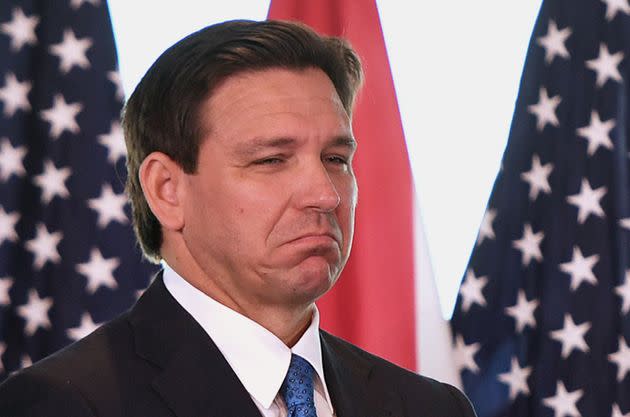Conservatives Say They Love America. So Why Are They So Scared Of Its History?

Florida Gov. Ron DeSantis threatened to block schools from teaching an AP course on African American history, saying it violated state law and was historically inaccurate.
My first day on the air as a talk radio host was Memorial Day, 2006. I opened the program criticizing the war in Iraq. It was going badly by then, but I had always opposed that intervention as a misadventure when we should have stayed focused on Afghanistan, where Osama bin Laden remained in hiding.
An uproar ensued. Listeners protested outside the radio station. A conservative group launched a national drive to have me fired. Residents circulated petitions at state fairs calling me unpatriotic, and disloyal to America, claiming I didn’t support the troops. I’m sure many of them brandished their cars with those “Support the Troops” magnets — made in China, by the way.
To the dismay of some, I did not get fired. Sadly, the radio station nixed my idea of bringing the protesters into the studio for an on-air discussion. But it was a lesson — one with which I was well familiar — in what happens when we shed light on discomfiting realities.
Time and time again, we find people convulsing over our nation’s uncomfortable truths, past or present, horrified at the thought of examining them, let alone acknowledging them, and fiercely determined to censor them.
Today’s targets are familiar: race, diversity, inequality, oppression, inclusion, gender and gender identity, anything that offends the sensibilities of whomever in whatever quarter.
The latest bogeyman: the College Board’s Advanced Placement history course on African American studies.
Based in New York, the nonprofit Board administers AP programs outlining concepts and skills students need for a college-level history course. High school students get college credits for taking such courses. The Board offers over three dozen courses in various disciplines — the arts, math, computer science, the sciences, world languages, U.S. and world history.
Sixty high schools across the country began teaching a pilot version of the African American course last fall, which has since been the target of conservative lawmakers seeking to limit how teachers approach discussions on history and race.
Last month, Florida Gov. Ron DeSantis (R) threatened to block the course from being taught, saying it violated state law and was historically inaccurate. He gave no specifics. (Maybe he should take the course.)
He has also announced plans to defund diversity, equity and inclusion programs at every public college in the state.
DeSantis, an expected presidential candidate in 2024, has spent his governorship signing one absurd law after another to protect the feelings of fragile conservatives, including the “Don’t Say Gay” law and the Stop WOKE Act.
If we want transparency from our government, and surely we do, we should also insist on transparency in our history.
Several outlets claimed the College Board caved to DeSantis’ demands. The Board vehementlydenied that, arguing it had completed its revisions last December, with time-stamped documentation to prove it.
Such opposition isn’t new. In 2014, critics objected to the AP curriculum for U.S. History — not African American studies; American history.
“Too negative,” critics cried.
Larry S. Krieger, who had already written several commentaries attacking the guidelines, argued that the framework “inculcates a consistently negative view of the nation’s past.”
Before long, local lawmakers inmultiplestates had gotten into the act.
Oklahoma state Republican Dan Fisher introduced a bill criticizing the framework for emphasizing “what is bad about America” and that it doesn’t teach “American exceptionalism.”
William Ligon, a Republican state senator in Georgia, said the framework painted free enterprise in a negative light and focused “more on what divides us instead of what unites us.”
Ligon, a 2020 election denier who pushed for a special session of the Georgia General Assembly to overturn the state’s presidential election results, was one of 16 state Republicans who signed on to an amicus brief for a Texas Supreme Court lawsuit that sought to nullify the results of four states in the 2020 election, including Georgia.
He’s also the subject of a grand jury investigation into whether former President Donald Trump and others illegally meddled in the state’s 2020 election.
So he’ll likely merit a historical footnote as one of this nation’s dividers.
Policymakers tried their hand, as well. Objecting to what they also thought was a negative portrayal of America, the school board in Jefferson County, Colorado, proposed a review of the AP History framework that would require teachers to “promote citizenship, patriotism, essentials and benefits of the free enterprise system.” Teachers were further told to avoid lessons that “encourage or condone civil disorder, social strife or disregard of the law.”
Like, what, the civil rights movement? The labor strikes of the late 19th century against horrid working conditions wrought by rapacious corporate robber barons of the Gilded Age?
In response, hundreds of students from at least five high schools recognized this for the act of intellectual vandalism it was and did a very American thing: They protested, staging mass walkouts. The district had to shut down four schools briefly because teachers called in sick in protest.

Students protest in Arvada, Colorado, on Sept. 23, 2014, against a proposal by the Jefferson County School Board to emphasize patriotism and downplay civil unrest in the teaching of U.S. history.
For what it’s worth, the school board comprised a newly elected conservative majority. Guess them folks would have a heck of a time with that Jan. 6 thingy.
“That weren’t no danged civil disobedience, just a big cookout that got a little out of hand!”
The board quickly aborted plans for the framework review, claiming it had been misunderstood.
Wrong. Students understood you all too well. You wanted to promote a “happy history” that would have left the students positive, patriotic and poorly informed. Can you imagine a criminal trial in which the jury only got half the truth and not the whole truth?
But then, what do you expect from a party and ideology with its own sordid history of engaging in falsehoods, conspiracy theories, and creating solutions for nonexistent problems?
It is simply a whitewashing of history (no pun intended). Only “happy history” will do. Discuss nothing offensive. How ironic that critics of “wokeness” who always mock people needing safe spaces have themselves gone all woke on certain subjects and are trying to create their own safe space by omitting what’s offensive or banning it altogether.
Book burning in the digital age. Too hyperbolic? Perhaps, but it’s not exactly inaccurate. It is disturbingly “Animal Farm”-ish and assuredly hypocritical in a nation where the oft-quoted momily reminds us we learn from our mistakes.
If that momily is true, how can we learn from the error of our ways if we refuse to examine them, let alone acknowledge their existence?
As Florida U.S. District Judge Mark Walker wrote in declaring the state’s Stop WOKE Act unconstitutional, “If Florida truly believes we live in a post-racial society, then let it make its case. But it cannot win the argument by muzzling its opponents.”
In other words, more free speech, not less. I assume conservatives put the freedoms of the First Amendment at least on par with that of the Second.
If we want to protect speech in all its forms, good and bad, why would we not say the same thing about our history in all its forms, good and bad?
Governments exist today that hide truths from their people, nations like North Korea, China, Saudi Arabia and Iran.
We pride ourselves on being different from those nations. One reason is that we’re not afraid to air our dirty laundry. What makes us any different if we try to oppress the dark parts of our past?
If we want transparency from our government, and surely we do, we should also insist on transparency in our history.
Without question, America’s history is brimming with moments of monumental greatness. But that greatness coexists with abominable atrocities and indefensible violations of our founding principles. You cannot celebrate a nation’s splendor without acknowledging its shame. Censoring discussions on one side in favor of only the other is not a path to enlightenment.
Yet some of us seem unable to accept that our nation has had and continues to have growing pains and is not perfect. Some of us behave as if American history were some sort of sacred cow.
It’s not. But we attack those who cite the ugly moments of our history as unpatriotic. Sorry, but if you can’t face the music about the bad in America’s history as well as its good, you are the unpatriotic one. Such a mindset is not only unpatriotic and servile; it is also morally treasonable and ultimately perilous, a crime against knowledge and, ultimately, wisdom.
“Those who cannot remember the past, are condemned to repeat it,” George Santayana wrote in his “Life of Reason.”
But he also wrote, “The world is not respectable; it is mortal, tormented, confused, deluded forever; but it is shot through with beauty, with love, with glints of courage and laughter; and in these, the spirit blooms timidly, and struggles to the light amid the thorns.”
And that is why history — all of our history — must be embraced. It is our great teacher. From it, we can learn who we were, what made us who we are, and guide our aspirations of who we can be. Unfortunately, some of us aren’t interested.

 Yahoo News
Yahoo News 